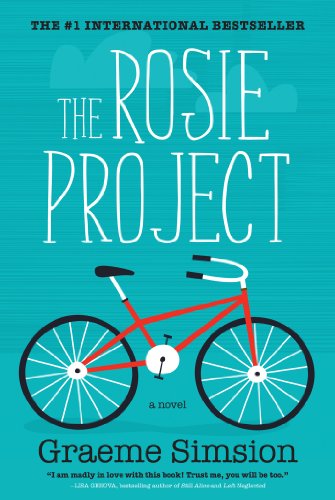Since I
started by blog, I’ve done an annual Advent Book Calendar highlighting books I
have enjoyed and authors I really like.
This year I thought I’d do an Advent Book Calendar with a twist; for
each day leading up to Christmas, I’m going to post a review of a book to which
I’ve given only one star (Throw a book at this one) or two stars (Don’t put this book in your book bag). Though I would not recommend these books,
others have disagreed with me. Each
book, on Goodreads, has received a 3 or 4 Star average rating.
Review of The Rosie Project by Graeme Simsion
2
Stars
 This is
another book I read only because it was chosen by my library book club. Fluff!
It’s described as a romantic comedy and I have enough problems with that
formulaic genre, but then the book goes further and has little romance and even
less comedy.
This is
another book I read only because it was chosen by my library book club. Fluff!
It’s described as a romantic comedy and I have enough problems with that
formulaic genre, but then the book goes further and has little romance and even
less comedy.
Don Tillman
is a 39-year-old geneticist with (undiagnosed) Asperger’s. He devises a plan to
find himself a wife. While involved with this project, he meets Rosie who
enlists his genetic expertise to help her identify her biological father. Of
course, Rosie and Don develop an unlikely relationship.
Lovers of
romantic comedy are obviously the ones writing the rave reviews. The book
certainly has all the elements of the genre: the seemingly ill-suited couple
who insist they have a just-friends relationship which inevitably develops into
something more, the prevalence of chance and coincidence, the predictable plot,
the comic set-pieces, the moments of less-than-profound epiphanies, and the
love-conquers-all theme. And there’s a sequel which will undoubtedly continue
to use the formula.
Some people
rave about Don and how he is a unique character. Countless examples of Don can
be found in popular culture. Don has been around in the guise of Shel(Don)
Cooper on The Big Bang Theory since
2007. How about characters on Bones
and Criminal Minds? And all of Don’s
musings about love and logic are certainly reminiscent of Mr. Spock on Star Trek. In terms of books, what about
The Incident of the Dog in the Nighttime?
But for me
it is not just a lack of originality in character that is the problem; Don is
not realistic as someone with an autism spectrum disorder. He possesses every attribute of an
"Aspie"? Then, after decades of rigid behaviour, he is able to
change? In a very short period of time he abandons his scheduling and learns to
read facial expressions and social cues?! An autistic person is not someone
with a “normal” personality trapped inside, a personality that can be released
by the love of another.
The author
seems to want people to realize that people’s differences should be appreciated
and accepted; those who demonstrate “variations in human brain function” and do
not fit “constructed social norms” (6) should not be ridiculed and shunned. Yet
at the same time, the author expects readers to laugh at Don and his inability
to function in social situations?! We are supposed to believe that just because
Don is accustomed to ridicule and rejection, he doesn’t suffer when others
laugh at him? Surely no reader believes Don is not capable of love so why would
he/she believe he is not capable of feeling hurt? Why not show the
ridiculousness of societal “norms”?
This book
is the type which will appeal to readers who want pure escapism. I found it
barely entertaining and certainly not memorable.
No comments:
Post a Comment